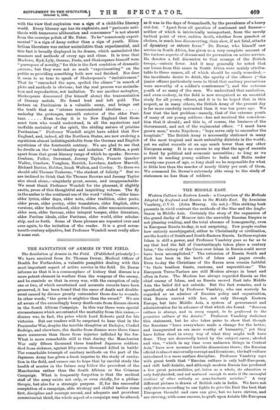THE SANITATION OF ARMIES IN THE FIELD.
The Sanitation of Armies in the Field. (Published privately.)— We have received from Dr. Thomas Dewar, Medical Officer of Health for Forfarshire, a valuable pamphlet dealing with this most important aspect of active service in the field. Dr. Dewar informs us that it is a commonplace of history that disease is a more potent element in warfare than the weapons of the enemy, and he reminds us that in every war, with the exception of only one or two, of which ascertained and accurate records have been preserved, it has been found that the cases of death and disable- ment caused by disease greatly outnumber those due to wounds. In other words, "the germ is mightier than the sword." We are all aware of the exceedingly heavy death-rate from disease shown in the South African Campaign. In this war there were special circumstances which accentuated the mortality from this cause,— disease was, in fact, tho price which Lord Roberts paid for his victories. But our readers will be surprised to hear that in the Peninsular War, despite the terrible slaughter at Badajoz, Ciudad Rodrigo, and elsewhere, the deaths from disease were three times more numerous than those from injuries inflicted by the foe. What is more remarkable still is that during the Manchurian War only fifteen thousand three hundred Japanese soldiers died from sickness, against fifty-seven thousand killed in battle' The remarkable triumph of sanitary methods on the part of the Japanese Army has given a fresh impetus to the study of sanita- tion in the field, and causes one to hope that by careful study the health of armies in the future may follow the precedent of the Manchurian rather than the South African or the Crimean Campaign. What is frequently forgotten is that the medical staff of the army exists not only, or even chiefly, for a philan- thropic, but also for a strategic purpose. If, for the successful completion of a campaign, able strategy and skilful tactics come first, discipline and courage second, and adequate and provident commissariat third, the whole aspect of a campaign may be altered, as it was in the days of Sennacherib, by the prevalence of a heavy sick-list. "Apart from all question of sentiment and finance— neither of which is intrinsically unimportant, from the merely tactical point of view, sudden death, whether from gunshot or cholera, is much less disconcerting, than slow, if not fatal, attacks of dysentery or enteric fever." Dr. Dewar, who himself saw service in South Africa, has given us a very complete' account of the various aspects of disease and its prevention on active service. He devotes a full discussion to that scourge of the British troops,—enterie fever. And it may generally be noted that our losses from this cause in South Africa were mainly attribu- table to three causes, all of which should be easily remedied.— the inordinate desire to drink, the apathy of the officers (" the junior officers particularly seem to think that sanitary precautions were unworthy of a soldier's countenance"), and the extreme youth of so many of the men. We understand that sanitation, and even cookery, in the field is now recognised as an essential study for all young officers, and it is to be hoped that in this respect, as in many others, the British Army of the present day is far more carefully instructed than it was ton years ago. We fear that the last problem—namely, that of the extreme youth of many of our young soldiers—bas not received the considera- tion that it should ; and this is, of course, the business of the Government, and not of the regimental officer. "I must have grown men," wrote Napoleon ; "boys serve only to encumber the hospitals." The British Army is necessarily stationed in many of the most tropical and most unhealthy districts in the world; yet we enlist recruits at an age much lower than any other European army. It is no excuse to say that the age of recruits is fixed by political and economic necessities ; so long as we persist in sending young soldiers to India and Malta under twenty-one years of ago, so long shall we be responsible for what is little less than the murder of nearly thirty per cent. of them. We commend Dr. Dowar's extremely able essay to the study of statesmen no less than of soldiers.






























































 Previous page
Previous page